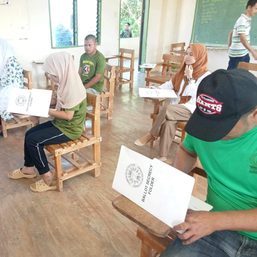SUMMARY
This is AI generated summarization, which may have errors. For context, always refer to the full article.

The campaign season for the 2022 elections will have different sets of restrictions for in-person gatherings, depending on where someone lives in the Philippines.
This unprecedented scenario comes as the threat of the novel coronavirus continues to be enemy number one in the conduct of poll-related activities.
According to the Commission on Elections (Comelec), provinces, cities, and municipalities in the Philippines will be under five category levels – with Level 5 having the most alarming pandemic situation, and where strict campaign curbs need to be put in place.
From the municipal to the national level, Comelec campaign committees (CCCs) – composed of a Comelec official as chairperson and officers of various government agencies as members – will be tasked to “classify category levels in their respective areas of jurisdiction,” based on Comelec Resolution 10732, which was promulgated on Wednesday, November 24.
Here’s what to expect under every category level.
Category Level 5
- Equivalent to Alert Level 5 as defined by the Interagency Task Force (IATF) on Emerging Infectious Diseases
- Prohibited: In-person campaigning, defined as the act of personally visiting voters from house to house
- Prohibited: Any kind of motorcade
- Prohibited: Caucuses, meetings, conventions, rallies, and miting de avance
Category Level 4
- Equivalent to Alert Level 4 as defined by the IATF
- Prohibited: In-person campaigning
- Allowed, up to 30% of the operational capacity of the enclosed outdoor venue: Caucuses, meetings, conventions, rallies, and miting de avance
- Allowed: Motorcades, depending on the vehicle
- Trucks, buses, mini-trucks, and jeepneys: 30% capacity
- Service-utility vehicles, sedans, and owner-type jeepneys: Up to 2 passengers per row, with 1 passenger on the driver’s row
- Tricycles: 1passenger in the side-car; a back-ride passenger is not allowed
- Motorcycles: No back-ride passenger allowed
Category Level 3
- Equivalent to Alert Level 3 as defined by the IATF
- Allowed: 3 campaign support staff joining the candidate or campaign leader for in-person campaigning
- Allowed, up to 50% of the operational capacity of the enclosed outdoor venue: Caucuses, meetings, conventions, rallies, and miting de avance
- Allowed: Motorcades, depending on the vehicle
- Trucks, buses, mini-trucks, and jeepneys: 50% capacity
- Service-utility vehicles, sedans, and owner-type jeepneys: Up to 2 passengers per row, with 1 passenger on the driver’s row
- Tricycles: 1 passenger each in the side-car and in the back-ride
- Motorcycles: No back-ride passenger allowed
Category Level 2
- Equivalent to Alert Level 2 as defined by the IATF
- Allowed: 5 campaign support staff joining the candidate or campaign leader for in-person campaigning
- Allowed, up to 50% of the operational capacity of either indoor or outdoor venue: Caucuses, meetings, conventions, rallies, and miting de avance
- Allowed: Motorcades, depending on the vehicle
- Trucks, buses, mini-trucks, and jeepneys: 50% capacity
- Service-utility vehicles, sedans, and owner-type jeepneys, tricycles: Full capacity
- Motorcycles: 1 back-ride passenger allowed

Category Level 1
- Equivalent to Alert Level 1 as defined by the IATF
- No limit on in-person campaigning
- Allowed, up to 70% of the operational capacity of either indoor or outdoor venue: Caucuses, meetings, conventions, rallies, and miting de avance
- Allowed: Motorcades, depending on the vehicle
- Trucks, buses, mini-trucks, and jeepneys: 70% capacity
- Service-utility vehicles, sedans, and owner-type jeepneys, tricycles: Full capacity
- Motorcycles: 1 back-ride passenger allowed
Common restrictions across all category levels
- Candidates and campaign leaders must not “enter any private dwelling during house-to-house campaigning,” even if they have the owner’s permission.
- Crowding around the candidate is prohibited.
- Actions that involve physical contact – handshakes, hugs, kisses, and going arm-in-arm – are not allowed.
- Taking selfies, photographs, “and other similar activities that require close proximity between the candidate and their companions in public” is also not allowed.
- Distribution of food, drinks, and other goods and items is prohibited.
- During motorcades and caravans, the vehicles must contain only candidates, campaign leaders, and supporters who are part of the same household.
- Stopovers are also prohibited during motorcades and caravans.
Requirements to hold a campaign activity
Any candidate, their representative, or the representative of an accredited political party must first secure a permit from the CCC of their locality at least 72 hours prior to the conduct of the campaign activity.
If they are only an authorized representative, they will need to present a special power of attorney when requesting a permit.
The application papers can be found here. Below are the requirements:
“The local government units, which have the authority to grant permits, can only deny a permit [if] a prior permit has been applied for or granted for the same location and the same time,” Comelec Spokesman James Jimenez said on Thursday, November 25.
If the CCC at their own level denies their application, they may file an appeal before a higher CCC. The CCC must make a decision “within a non-extendible period of 24 hours,” based on the Comelec resolution.
The candidate must also submit an affidavit of compliance within 72 hours after every campaign activity. Barangay officials assigned to monitor the event must also submit their report within the same time period.
The poll body reminded candidates that any act that is tantamount to a violation of the Omnibus Election Code shall face penalties, including at least one-year imprisonment and disqualification from public office, if proven guilty.
But, as always, Jimenez asked the public to manage expectations.
“This will undergo due process. Do not expect that someone will be disqualified tomorrow if you see a violation today,” he said.
The campaign period begins on February 8, 2022, for national aspirants, and on March 25, 202, for local candidates. – Rappler.com
Add a comment
How does this make you feel?









There are no comments yet. Add your comment to start the conversation.